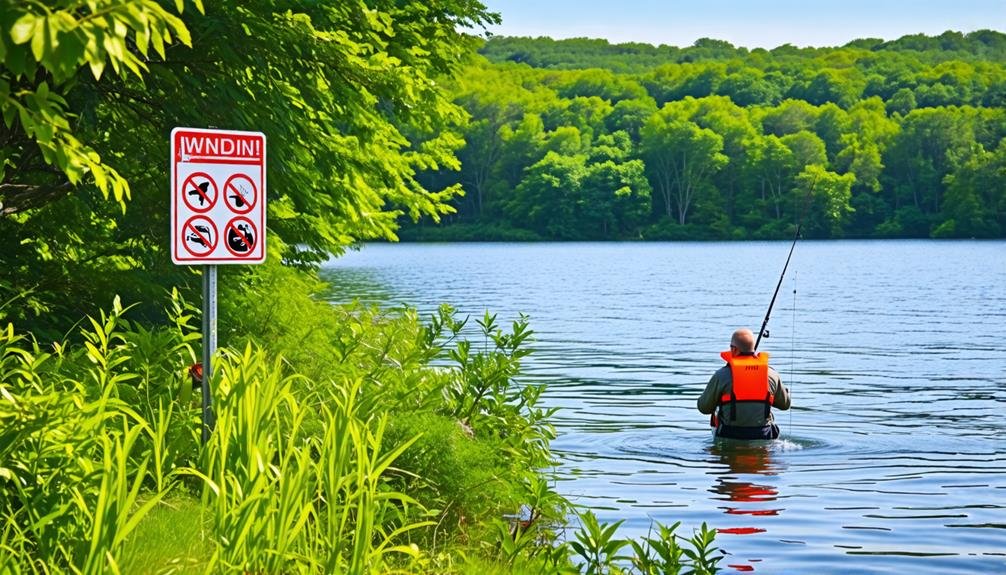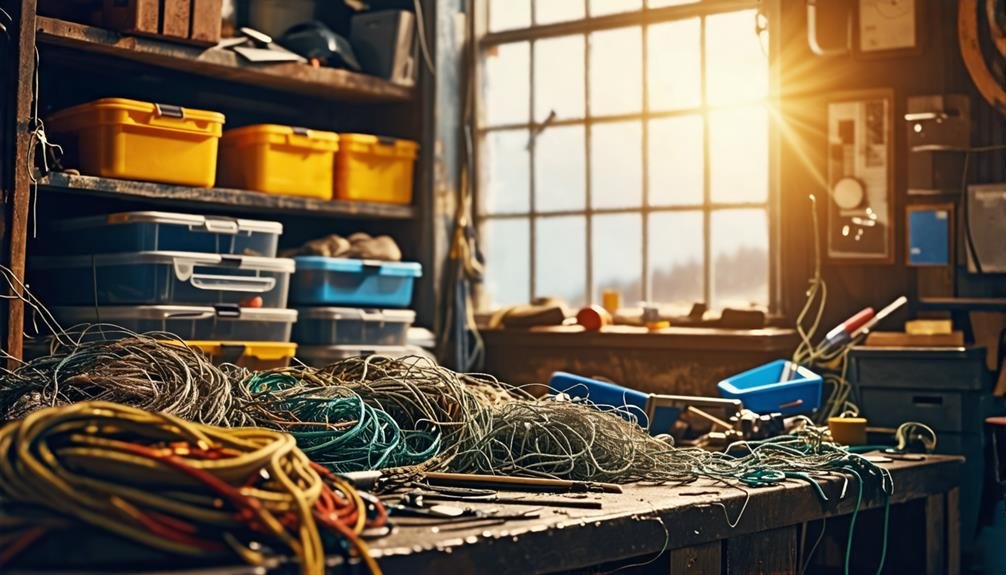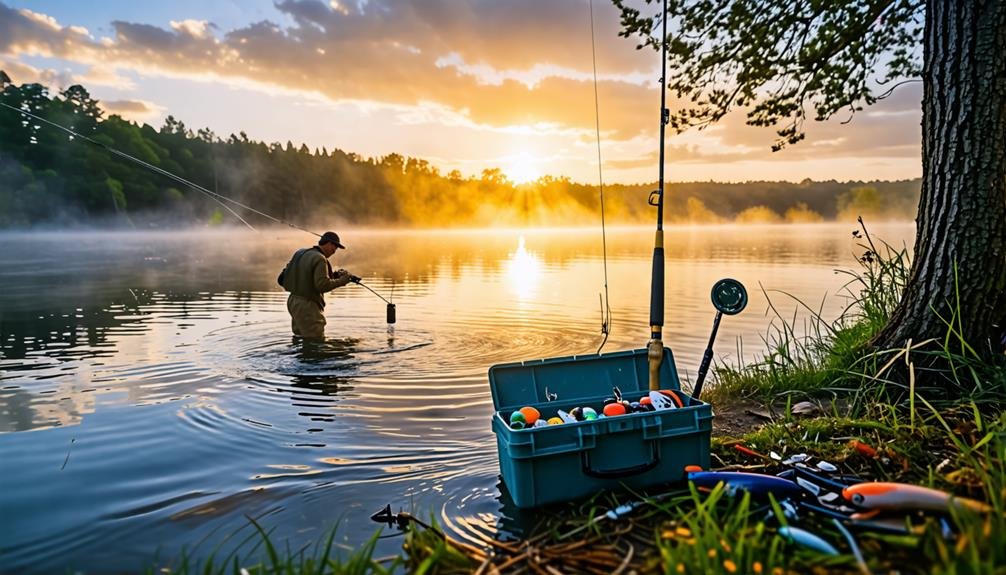Common freshwater fishing mistakes include neglecting gear maintenance, improper bait selection, and ignoring fish behavior. Before heading out, always inspect your rods and reels for wear, and keep your tackle box organized. Choosing bait that matches the local fish species can greatly improve your success. Pay attention to fishing techniques, such as casting in productive areas and maintaining a consistent reel speed. Always check local regulations and stay safe by monitoring weather conditions. By understanding these common pitfalls, you can enrich your fishing experience and increase your success rate in the field ahead.
Preparation and Equipment Errors
Neglecting proper preparation and equipment can significantly diminish a freshwater fishing trip, often resulting in lost chances and safety risks. Before embarking on your fishing journey, it is essential to ensure thorough gear maintenance. Regularly inspect your Shimano rods and Penn reels for signs of wear, replacing any frayed lines or bent hooks. A well-cared-for setup enhances your fishing performance and provides a safer environment.
Additionally, organizing your tackle box is crucial for fishing success. A disorganized container can lead to frustration and squandered time. Arranging your gear allows for quick access to important items like Rapala lures, bobbers, and pliers.
Choosing the right bait is another critical factor in preparation. Knowing the specific species you wish to catch and selecting the corresponding bait can significantly increase your success rate. Whether you prefer using live bait, such as nightcrawlers, or artificial lures, aligning your choice with the local fish species is essential.
Common Technique Missteps
In the realm of freshwater fishing, common technique missteps can greatly influence your success. For example, casting in the wrong locations, where fish are less likely to be found, can lead to frustration. Furthermore, maintaining an inconsistent reel speed and disregarding fish behavior can prevent you from catching what you seek, emphasizing the need to grasp these aspects for a fulfilling fishing experience.
Incorrect Casting Locations
Casting in inappropriate spots can significantly diminish your chances of reeling in a big one. Recognizing aquatic life patterns and their favorite environments is essential for successful fishing. Many anglers frequently make the mistake of casting in the wrong locations, which often results in disappointment. To enhance your fishing ventures, keep the following tips in mind:
- Monitor water flows: Fish often accumulate in zones where sustenance is abundant, particularly near structures or areas where currents change.
- Look for activity indicators: Keep an eye out for leaping fish or surface disturbances, signaling feeding behavior.
- Leverage natural cover: Aim for areas near boulders, submerged logs, or lush plant life, as these provide refuge for fish.
Inconsistent Reel Speed
Inconsistent reel speed can lead to missed chances and lower effectiveness in attracting fish, disrupting the natural presentation of lures or baits. Many freshwater anglers make mistakes by reeling too quickly or too slowly, not aligning with the rhythm expected by fish. This inconsistency can cause fish to lose interest and swim away.
To improve fishing success, developing a steady and consistent reel pace is essential. For instance, when using Berkley spinnerbaits, a slow and steady retrieve mimics injured prey, making it more enticing to fish. On the other hand, when employing topwater lures like the Heddon Zara Spook, a quick, erratic motion generates a sense of urgency that can draw fish in.
To maintain consistent reel speed, practice in a tranquil pond, allowing you to concentrate on technique without interruptions. Observe how various species respond to different retrieval speeds and adjust your method accordingly. By mastering your reel pace, you enhance your likelihood of success and create a more fulfilling fishing adventure. Remember, patience and practice are vital for becoming a skilled angler.
Ignoring Fish Behavior
An angler's grasp of aquatic life can greatly impact their success on the lake, as overlooking these behaviors often results in unproductive tactics and lost chances. Aquatic species are not merely inactive beings; they display habits shaped by variables such as temperature, daylight, and water quality. Disregarding these indicators can lead to frustration and dissatisfaction, even for experienced fishermen.
- Observing bass during feeding can indicate their preferred lures.
- Recognizing seasonal shifts aids in selecting optimal fishing spots.
- Understanding trout behavior at dawn and dusk increases catch rates.
Legal and Safety Oversights

Legal and safety oversights can greatly diminish a fishing adventure, affecting both the angler's success and the preservation of aquatic ecosystems. Many anglers neglect the necessity of obtaining a fishing permit, which is essential for lawful fishing and aids in conservation initiatives. Noncompliance with local fishing regulations can result in penalties and adversely affect fish populations.
Moreover, safety measures are crucial. Monitoring weather patterns prior to embarking on a fishing trip is vital, as abrupt shifts can create hazardous conditions. For instance, fishing during inclement weather, such as thunderstorms, can pose significant risks to both anglers and wildlife. Equipping oneself with essential gear, such as life jackets from brands like Onyx and suitable apparel, enhances safety while enjoying the liberating experience of fishing.
Furthermore, recognizing optimal fishing times can elevate your outing. Early mornings or late evenings often yield superior results. By adhering to legal requirements and prioritizing safety, you can relish your time on the water while contributing to the sustainability of aquatic habitats. Remember, being knowledgeable and prepared not only enriches your fishing experience but also safeguards the natural freedom we value.
Hook Maintenance Mistakes
Maintaining your hooks is crucial for successful fishing, as even minor neglect can lead to disappointing catches. Regularly replacing old hooks, sharpening them after use, and storing them properly can greatly enhance your fishing experience. For example, a sharp hook can penetrate a fish's mouth more easily, ensuring a higher catch rate, while proper storage prevents damage to both the hooks and your fishing line.
Regular Hook Replacement
Regular hook replacement is essential for achieving peak fishing performance and enhancing your chances of landing a trophy fish. As an avid angler, your bond with the environment and the thrill of catching a fish rely on the reliability of your equipment. Worn-out and blunt hooks can lead to missed bites and wasted hours. Enjoy the liberating experience of fishing by keeping your hooks in prime condition.
- Feel the adrenaline surge as you secure that massive catch, confident that your gear is up to the task.
- Savor the pleasure of fishing without the annoyance of a faulty hook.
- Enjoy the tranquility that comes from knowing you're ready for any fishing trip.
To maximize your fishing experiences, routinely check your hooks and replace them when necessary. Investing in new hooks can translate to more fruitful outings, letting you appreciate the beauty of nature to the fullest. By focusing on hook upkeep, you enhance not only your fishing success but also your overall enjoyment in the wilderness. Embrace this crucial practice and let your fishing journeys unveil new possibilities.
Hook Sharpening Techniques
Proper hook sharpening techniques are crucial for ensuring that fishing hooks remain effective and enhance the chances of a successful catch. A sharp fishing hook penetrates the fish's mouth more easily, leading to better hook sets and ultimately, a higher catch rate. To sharpen your fishing hooks, you can utilize a fine sharpening stone or a specialized hook file like the Rapala Hook File.
Begin by gripping the hook firmly and running the sharpening tool along the hook's point at a 45-degree angle. This method rejuvenates the hook's sharpness without altering its shape.
After sharpening, inspect the hook closely. If the point is still bent or the hook has become too worn, it may be time to replace it altogether. Remember, dull hooks are a common reason for missed catches, so make it a habit to check and sharpen your hooks regularly, especially after fishing trips. Additionally, maintaining a routine for hook care helps ensure that you're prepared for your next fishing expedition. By investing a little time in hook maintenance, you can significantly enhance your fishing experience and enjoy the freedom of angling with confidence.
Proper Hook Storage
Proper maintenance of fishing hooks goes beyond just keeping them sharp; it also requires appropriate storage to protect them from damage and ensure they perform well. Effective storage prevents issues like rust, bending, and tangling, which can ruin your fishing adventures. By caring for your hooks, you ensure they are always ready for your next fishing trip.
Here are essential tips for effective hook storage:
- Utilize a specialized tackle box, such as those from Plano or Flambeau, to keep your hooks organized and easily reachable.
- Refrain from placing hooks loose in pockets or bags, as this can cause damage and potential injury.
- Store hooks in a moisture-free space to avoid rust and degradation.
Gear Maintenance Issues

Regular inspection and maintenance of fishing equipment significantly influences angling success and the durability of gear. Routine checks can avert unforeseen issues while fishing. For example, rinsing Shimano rods and Penn reels after each outing eliminates dirt and salt residues, promoting optimal performance. Examining your fishing line for any signs of wear or entanglements is essential to prevent losing valuable catches.
Replacing deteriorated lines and hooks is vital, as outdated gear can lead to disappointment during fishing trips. Organizing your tackle box not only enhances accessibility but also allows for quick identification of items needing replacement. Adjusting the drag settings on your Abu Garcia reel is another critical maintenance task; this adjustment safeguards your line from snapping when you reel in a fish.
Proper storage of your gear after each fishing trip is crucial for extending its lifespan. Store rods vertically and cover reels to protect them from dust and potential damage. By following these simple practices, you can fully enjoy the excitement of fishing without the anxiety of equipment malfunction. This proactive approach enables you to immerse yourself in the experience and relish the joy of connecting with nature.
Bait and Species Mismatches
Choosing the ideal bait is crucial for successful freshwater angling, as mismatches between bait types and target species can greatly diminish your catch rates. When you match your bait with the dietary habits of your desired fish, you substantially enhance your chances of landing that trophy catch. Invest time in understanding the species inhabiting your local lakes and rivers, along with their natural prey.
- Feel the thrill of hooking your ideal trout.
- Sidestep the frustration of barren lines and squandered chances.
- Delight in the joy of engaging with nature through productive fishing.
For instance, utilizing nightcrawlers for bass fishing can yield good results, but if you're pursuing rainbow trout, opt for tiny minnows or artificial flies from brands like Orvis or Rapala. Aligning the size, hue, and action of your bait with the natural diet of your target species can truly transform your fishing outings. Don't let mismatches between bait and species deter your efforts; arm yourself with the insights and freedom necessary for a rewarding fishing experience. With a bit of planning and knowledge, you can elevate your fishing adventures and revel in the beauty of the great outdoors.




